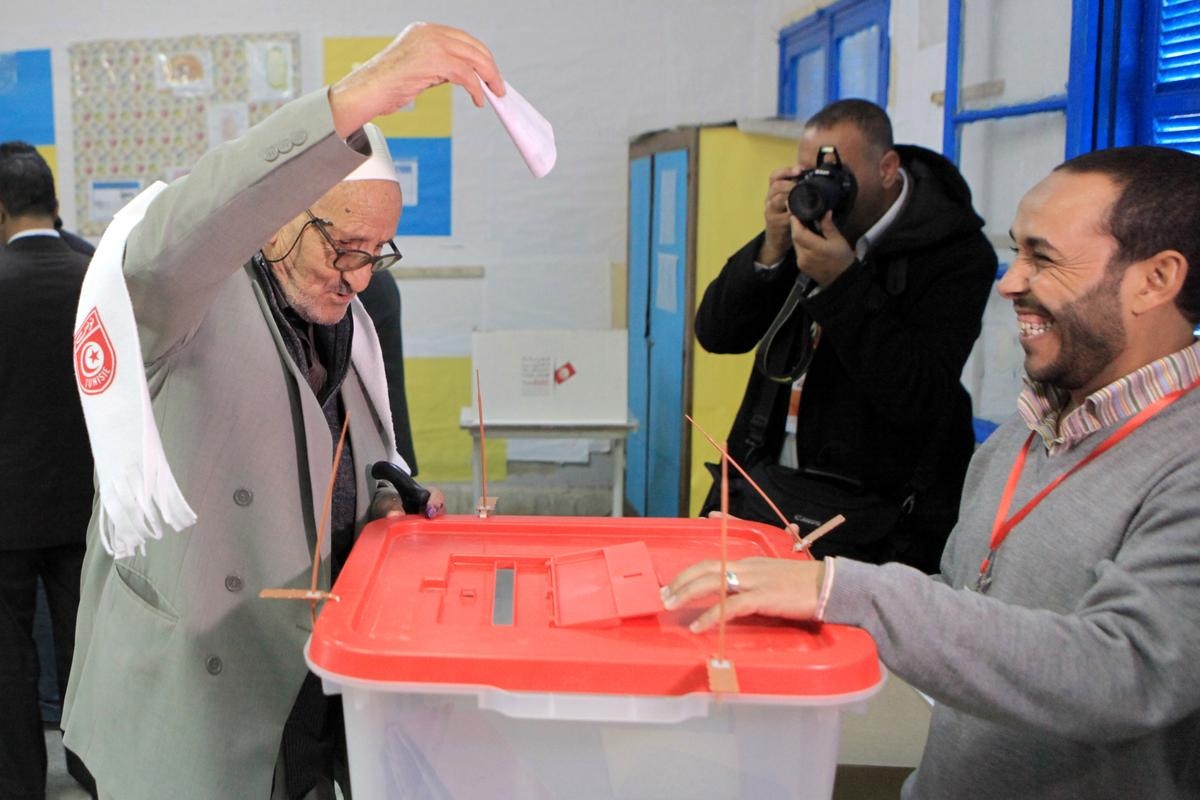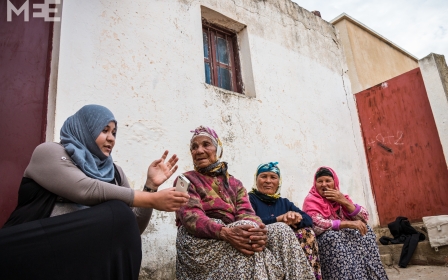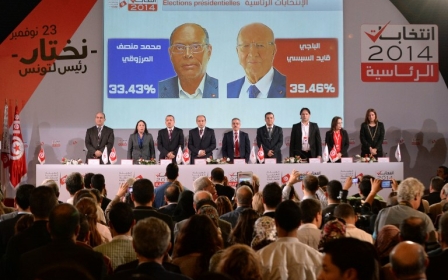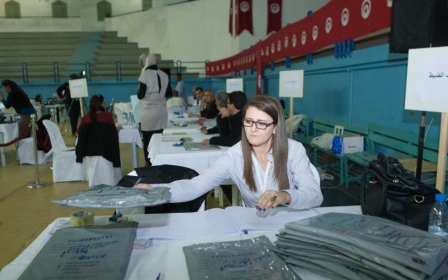Fear and nostalgia as Tunisia transitions to democracy

TUNIS: Several days before the Tunisian presidential elections, 26-year-old Ameni Hammami was sitting with a group of friends at a café in one of Tunis’ upscale neighbourhoods discussing candidates. Reflecting on what has changed since Tunisia’s revolution, Hammami noted that four years ago, they would not be having this conversation. “We would switch off our mobiles,” she said with a laugh, out of fear that the government would listen in on what they were saying through their phones.
On Sunday, 23 November, Tunisians participated in the first free presidential elections in the country’s history. According to official results released on Wednesday, Beji Caid Essebsi received 39.5 percent of the vote with interim president, Moncef Marzouki coming in second place with 33.4 percent. The two frontrunners, out of a field of 27 candidates, will now face each other in a run-off election to be held next month.
Coming a month after successful parliamentary elections, the international community is celebrating the vote as the final step in Tunisia’s transition to democracy. But, as the past weighed heavily on the first round of presidential voting, many Tunisians are less convinced that their country has crossed the threshold and see much more work that needs to be done to secure the new system.
Polarised between fear and nostalgia
The presidential campaign was, in many ways, defined by a combination of fear and nostalgia related to the past used by the Marzouki and Essebsi camps to try to persuade voters.
Essebsi’s Nidaa Tunis, which won 86 of 217 seats in last month’s parliamentary elections, is a collection of old regime figures, trade unionists and leftists of different stripes. The party came together to form a counter-balance to the moderate Islamist party, Ennahda, which dominated the first post-revolutionary elections in 2011.
At 87 years old, Essebsi held positions in the regimes of Habib Bourguiba and Ben Ali, Tunisia’s two autocratic, post-independence leaders. If he wins the presidency, Nidaa will control the parliament, the prime minister’s office and the presidency.
In his campaign, Marzouki, a human rights advocate and opposition figure exiled under Ben Ali, played on the association between Essebsi, Nidaa Tunis and the old regime. He cautioned voters against the return of one party rule and authoritarianism.
Bashar Kharatt, a 23-year-old tradesman, shared the fear of one party rule. He voted for Marzouki in hopes of creating a balance of power between the parliament and presidency. “Voting for Essebsi could bring back the dictatorship,” he said.
For his part, Essebsi, casting himself in the legacy of Bourguiba, campaigned on widespread frustrations with the interim government headed by Marzouki. A stuttering economy, high unemployment, the emergence of Islamic militant attacks and uncertainty about the future since the revolution have made some Tunisians nostalgic for the perceived stability and security of the past.
In a Pew Research poll released in October, 73 percent of Tunisians said they preferred a strong economy to a good democracy. Additionally, 59 percent said they preferred a strong leader compared to 38 percent who preferred a democratic form of government, a trend that has almost completely reversed since 2012.
Essebsi’s image as a strong, elder statesman capable of restoring security and developing good relations with other countries was a major factor in 21-year-old Sammy Abdessmad’s decision to vote for him. “He’s a smart man. He’s been a politician since he was [young],” Abdessmad said, emphasising his experience.
For others frustrated by the polarisation of Tunisian politics, the appeals to fear and nostalgia both ring hollow. “I believe this bi-polarisation suits both Essebsi and Marzouki,” said 22-year-old Shams Abdi, an opposition activist under Ben Ali and active civil society member.
“I don’t feel nostalgia for security because I didn’t enjoy any security. I don’t feel nostalgia for economic stability because I didn’t enjoy any economic stability,” she added. She also is not afraid of the regime returning because she already lived under its oppression as an activist and is determined to keep up the fight should it come back.
Abdi voted for the Popular Front candidate, Hamma Hammami, who came in third place. “I’m asserting that a third way does exist and if it doesn’t exist then a third way should emerge, and a forth way, and a fifth way and a sixth way if need be,” she said.
Returning to the past?
While not shared by all, the fear of the old regime returning is particularly strong among Ennahda supporters. “I understand the fear because it’s based on reality,” said Sayida Ounissi, a 27-year-old MP elect from Ennahda. Members of the party were systematically oppressed, imprisoned, tortured and forced into exile under the Ben Ali regime.
Ounissi, however, is confident in Tunisia’s new constitutional system. “I personally think that our counter powers are strong enough,” she said, adding that she will work in the parliament to prevent the return of old practices and dictatorship.
The fact that power is not concentrated in the hands of one institution makes a situation like the return of a dictatorial regime in Egypt less likely in Tunisia, according to political consultant Youssef Cherif.
“Here in Tunisia there are a lot of players,” he said, compared to Egypt where the army never relinquished economic or political power after the revolution that deposed long-time dictator, Hosni Mubarak.
The military and police in Tunisia are not strong enough by themselves to impose political order in the country. The public sphere is also populated by a number of political parties, trade unions, businessmen and civil society organisations. “Each one has a different view of how things should be,” Cherif explained, forming healthy counter-balances to each other.
The new constitution also divides executive authority between the offices of the president and the prime minster, gives the opposition control of key committees in the parliament, and calls for the creation of an independent constitutional court to act as a check on abuses of power.
For voter Fadhel Zaher, 54, the division of power is a reason to be confident. “Now there is a constitution and if the president does anything wrong he will be punished according to the constitution,” he told MEE.
The transition continues
Still, the biggest hurdles of the transition may lie in the future.
“The political situation is very fragile,” Hamadi Redissi, a professor of politics at the University of Tunis said. Its eventual success depends on whether the next government will be able to provide enough economic stability for the newly formed democratic institutions to take root. “In two years, if the newcomers are not able to do it the country will collapse,” he added.
Cherif also thinks the transition is on-going. Corruption is still rampant, the economy needs to improve and educational reform need to be implemented to inculcate a culture of democracy. He sees this as a ten-year process that began when Ben Ali fled the country.
If there is no major shock to the new system by 2021, he said, “there will be something established, which is that Tunisia can be ruled through several parties, can be ruled with civil society engaged in the process, can be ruled with less human rights violations and people will understand that human rights violations need to be criticised and people will criticise that without being afraid.”
In the eyes of Zahar as a voter, the fact that Tunisia is holding free and fair elections - in comparison to the conditions in other Middle Eastern and North African countries that saw protests against their authoritarian rulers in 2011 - is a major accomplishment.
The return of the police state that prompted Hammami and her friends to switch off their phones while discussing politics may be unlikely for the time being. But, the country has not quite gotten out from under the weight of the past, according to Lotfi Abdili, a 43-year-old comedian who spoke to MEE at a polling station in Tunis. “We are just looking at the door of democracy from a distance, but we’re not there yet,” he said.
New MEE newsletter: Jerusalem Dispatch
Sign up to get the latest insights and analysis on Israel-Palestine, alongside Turkey Unpacked and other MEE newsletters
Middle East Eye delivers independent and unrivalled coverage and analysis of the Middle East, North Africa and beyond. To learn more about republishing this content and the associated fees, please fill out this form. More about MEE can be found here.




